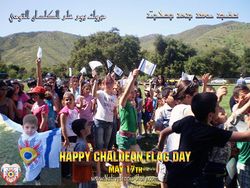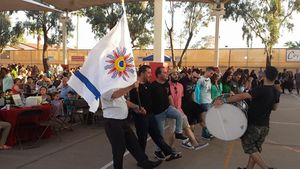Difference between revisions of "Chaldophobia"
(Created page with "Chaldean Debka Dance {{Infobox Religious group |group = Chaldean Christians<br/>(<big>ܟܲܠܕܵܝܹܐ</big> ''Kaldāye'') |image= ...") |
|||
| Line 13: | Line 13: | ||
|region4 = {{flag|Turkey}} | |region4 = {{flag|Turkey}} | ||
|pop4 = 8,000 | |pop4 = 8,000 | ||
| − | |langs = [[Chaldean language|Chaldean language | + | |langs = [[Chaldean language|Chaldean language]], [[Chaldean Neo-Aramaic]] |
|rels = [[Chaldean Christianity]] (in union with [[Roman Catholic Church|Rome]]) | |rels = [[Chaldean Christianity]] (in union with [[Roman Catholic Church|Rome]]) | ||
| scrips = The [[Bible]] | | scrips = The [[Bible]] | ||
Revision as of 05:47, 24 February 2016
 Chaldeans from California, 21st century | |
| Regions with significant populations | |
|---|---|
| 550,000 | |
| 40,000 | |
| 20,000 | |
| 8,000 | |
| Religions | |
| Chaldean Christianity (in union with Rome) | |
| Scriptures | |
| The Bible | |
| Languages | |
| Chaldean language, Chaldean Neo-Aramaic | |
Chaldophobia /kælˈdiːən/ (ܟܠܕܝ̈ܐ), or Anti-Chaldean,
Chaldophobia (also known as anti-Chaldaic or anti-Chaldeanism) is prejudice against, hatred of, or intolerance towards Chaldeans as an ethnic, religious, or racial group. A person who holds such position is an anti-Chaldaic. Anti-Chaldeanism is widely considered to be a form of racism.
Although Chaldaic refers to the speakers of the Chaldean language (Babylonian Aramaic) the term was popularized in Iraq around the twentieth and twenty-first century. The term was most highlighted during the reign of Saddam Hussein (Ba’ath regime) as he refused to categorize Chaldeans as their own ethnicity, rather labeled them as ‘Arab Christians’.
Anti-Chaldeanism may be expressed in a variety of ways including: denying the Chaldean ethnicity, people and culture. In addition to slander and misrepresentation, Chaldophobia may also be used to define the deliberate denouncing of the Chaldean nation and/or race.
Chaldeans are the Native and ethnic people of Mesopotamia, [1], originally called The Church of the East, which was that part of the original universal church (Catholicos) until the 4th century AD when Chaldeans followed Bishop Nestorius and split from the universal Christian church. Chaldeans were called Chaldean Nestorian until 1553 AD when Chaldeans Rejoined the universal church and entered communion with the Catholic Church.[2]
In addition to their ancient Mesopotamia in Iraq, northeast Syria, northwest Iran and southeast Turkey, (a region roughly corresponding with ancient Mesopotamia) Chaldean people communities are found in the United States, Sweden, Germany, France, Canada, Lebanon, Jordan and Australia.[3]
Chaldean Catholics of Mesopotamia started the Saint Thomas Christians of India (also called the Chaldean Syrian Church), who are also sometimes known as "Chaldean Christians".
History

Chaldeans are native people of Mesopotamia. The term Chaldean is also noted in the Holy Bible of the Hebrew Ur Kasdim (according to long held Jewish tradition, the birthplace of Abraham in Chaldea) as meaning Ur of the Chaldees.[4]
The modern Chaldean Catholics are native Chaldeans of Mesopotamia [5] and originated from ancient Chaldean communities living in and indigenous to Iraq/Mesopotamia which was known as Chaldea from the 53rd century BC till today as Chaldean people continue to survive in Mesopotamia.
Chaldean towns in northern Iraq
- Zakho
- Alqosh (ܐܠܩܘܫ)
- Ankawa (ܥܢܟܒ݂ܐ)
- Araden (ܐܪܕܢ)
- Baqofah (ܒܝܬ ܩܘܦ̮ܐ)
- Batnaya (ܒܛܢܝܐ)
- Karamles (ܟܪܡܠܫ)
- Shaqlawa(ܫܩܠܒ݂ܐ)
- Tel Isqof (ܬܠܐ ܙܩܝܦ̮ܐ)
- Tel Keppe (ܬܠ ܟܦܐ)
See also
- Chaldean people
- List of Chaldeans
- Church of the East
- Chaldea
- Emmanuel III Delly
- List of Chaldean settlements
References
Cite error: Invalid <references> tag;
parameter "group" is allowed only.
<references />, or <references group="..." />![]() This article incorporates text from a publication now in the public domain: Herbermann, Charles, ed. (1913). Catholic Encyclopedia. Robert Appleton Company.
This article incorporates text from a publication now in the public domain: Herbermann, Charles, ed. (1913). Catholic Encyclopedia. Robert Appleton Company.
External links
| Wikimedia Commons has media related to Chaldean Catholic Church. |
- The Chaldean Catholic Church
- Iraq: Chaldean Christians UNHCR
- Chaldean Christians in the Catholic Encyclopedia
- BBC: Who are the Chaldean Christians?
- ↑ Chaldean Patriarch Sako. July 2015 "We are CHALDEANS" adherent of the Chaldean Catholic Church
- ↑ BBC NEWS (March 13, 2008). "Who are the Chaldean Christians?". BBC NEWS. Retrieved March 26, 2010.
- ↑ Edmund Ghareeb, Beth Dougherty (2004). Historical Dictionary of Iraq. Scarecrow Press. p. 56. ISBN 978-0-8108-4330-1.
- ↑ Biblical Archaeology Review May/June 2001: Where Was Abraham's Ur? by Allan R. Millard
- ↑ Nisan, M. 2002. Minorities in the Middle East: A History of Struggle for Self Expression .Jefferson: McFarland & Company. Jump up ^ http://www.upenn.edu/pennpress/book/14225.html
